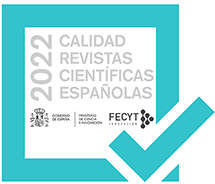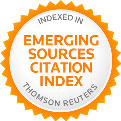Low Skilled adults’ memories about their Physical Education Teachers. [Los recuerdos de adultos con baja competencia motriz sobre sus Profesores de Educación Física].
Resumen
Abstract
The main purpose of this study was to analyze retrospectively the memories of a group of adults with low skills and the relationships between their memories and their physical education teachers during their school time. Ten adults (7 women and three men) participated in this study, aged between 25 and 56 years that declared to be low skilled during their school days. In order to carry out this study, a semi-strutured interview was conducted focusing the attention on obtaining memories of participants in their PE classes during their schoolage, and mainly their perceptions and feelings about their Primary and Secondary PE teachers. Results showed that the memories of behaviors and personality of their PE teachers were more important for participants than the learning from activities that their PE teachers taught. The feelings and emotions about his/her PE teachers were mostly negative, characterized by humiliation, abandonment, lack of help or indifference towards them. For these participants, their PE teachers did not live up to their needs. Knowing these memories had permitted the researchers to know a hidden part of the PE subject that is referred to a sector of the school population that shows low motor competence.
Resumen
El objetivo principal de este estudio fue analizar retrospectivamente los recuerdos de un grupo de adultos torpes y sus relaciones con sus profesores de educación física durante su época escolar. Diez adultos (7 mujeres y tres hombres) participaron en este estudio, con edades comprendidas entre 25 y 56 años, que declararon ser poco competentes en educación física durante sus años escolares. Para llevar a cabo este estudio, se desarrolló una entrevista semi-estructurada enfocada en obtener recuerdos de los participantes en sus clases de educación física, y principalmente sus percepciones y sentimientos sobre sus profesores de educación física tanto de primaria como de secundaria. Los resultados mostraron que los recuerdos de los comportamientos y de la personalidad de sus profesores de educación física eran más importantes para los participantes que las actividades de aprendizaje que estos profexdzsores les proponían. Estos sentimientos y emociones sobre sus profesores de educación física fueron en su mayoría negativos, caracterizados por la humillación, abandono, falta de ayuda o indiferencia hacia ellos. Para estos adultos, los profesores de educación física no supieron acometer sus necesidades. Conocer estos recuerdos permite conocer una parte oculta de la asignatura y que se refiere a un sector de la población escolar que muestra baja competencia y torpeza en las clases.
https://doi.org/10.5232/ricyde2020.06001
References/referencias
Barney, D.; Prusak, K. A.; Beddoes, Z., & Eggett, D. (2016). Picking teams: Motivational effects of team selection strategies in Physical Education. The Physical Educator, 73, 230-254.
https://doi.org/10.18666/TPE-2016-V73-I2-6212
Beltrán, V. J.; Devis, J.; Peiró, C., & Brown, D. H. K. (2012). When physical activity participation promotes inactivity: Negative experiences of Spanish adolescents in physical education and sport. Young & Society, 44(1), 3-27.
https://doi.org/10.1177/0044118X10388262
Beltran, V. J., & Devis, J. (2919). El pensamiento del alumnado inactivo sobre sus experiencias negativas en educación física: los discursos del rendimiento, salutismo y masculinidad hegemónica. RICYDE. Revista Internacional de Ciencias del Deporte, 55(15), 20-24.
https://doi.org/10.5232/ricyde2019.05503
Bouffard, M.; Watkinson, E. J., & Thompson, L. P. (1996). A test of the Activity Déficit Hipótesis with Children UIT Movement Difficulties. Adapted Physical Activity Quarterly, 13, 61-73.
https://doi.org/10.1123/apaq.13.1.61
Boyer, P. (2009). What are memories for? Functions of recall in cognition and culture. In P. Boyer & J.V. Werstch (Eds.), Memory in and culture (pp.3-28). Cambridge: Cambridge University Press.
https://doi.org/10.1017/CBO9780511626999.002
Cardinal, B. J.; Yan, Z., & Cardinal, M. K. (2013). Negative Experiences in Physical Education and Sport: How Much Do They Affect Physical Activity Participation Later in Life? Journal of Physical Education, Recreation & Dance, 84(3), 49-53.
https://doi.org/10.1080/07303084.2013.767736
Carlson, T. B. (1995). We hate the gym. Student alienation from physical education. Journal of Teaching in Physical Education, 14(4), 467-477.
https://doi.org/10.1123/jtpe.14.4.467
Casey, A., & Quennerstedt, M. (2015). "I just remember rugby": Re-membering Physical Education as more than a Sport. Research Quarterly for Exercise and Sport, 86, 40-50.
https://doi.org/10.1080/02701367.2014.977430
Conway, M. A. (2001). Sensory-perceptual episodic memory and its context: Autobiographical memory. Philosophical Transactions of the Royal Society of London, 356, 1375-1384.
https://doi.org/10.1098/rstb.2001.0940
Conway, M. A., & Rubin, D. C. (1993). The structure of autobiographical memory. In A. F. Collins, S. E. Gathercole, M. A. Conway, & P. E. Morris (Eds.), Theories of memory (pp. 107-137). Hillsdale: Erlbaum.
Conway, M. A., & Pleydell-Pearce, C. W. (2000). The construction of autobiographical memories in the self-memory system. Psychological Review, 107, 261-288.
https://doi.org/10.1037/0033-295X.107.2.261
Ennis, C. D. (2000). Canaries in the Coal Mine: Responding to Disengaged Students Using Theme-Based Curricula. Quest, 52(2), 119-130.
https://doi.org/10.1080/00336297.2000.10491705
Fitzpatrick, D.A., & Watkinson, J. (2003). The lived experience of physical awkwardness: Adults' retrospective views. Adapted Physical Activity Quarterly, 20, 279-297.
https://doi.org/10.1123/apaq.20.3.279
Gabrus, S. L. (2014). What is the perception of overweight students concerning their experiences in physical education? Journal of Physical Education, Recreation and Dance, 85(8), 46.
https://doi.org/10.1080/07303084.2014.946838
Gómez, M.; Ruiz, L. M., & Mata, E. (2006). Los problemas evolutivos de coordinación en la adolescencia: análisis de una dificultad oculta. RICYDE. Revista Internacional de Ciencias del Deporte, 1(3), 44-54.
https://doi.org/10.5232/ricyde2006.00303
Hands, B., & Parker, H. E. (2019). Physical Education and activity in children and adlescents with DCD. In A. L. Barnett & E. L. Hill (Eds.), Understanding Motor Behaviour in Developmental Coordination Disorder (pp.137-154). New York: Routledge.
https://doi.org/10.4324/9781315268231-9
Herderson, S.; Knight, E.; Losse, A., & Jongmans, M. (1991). The clumsy child in school. Are we doing enough? British Journal of Physical Education, Research Supplement, 9, 2-9.
Kirby, A., & Roseunblum, A. (2008). The Adult Developmental Coordination Disorder/ Dyspraxia Checklist (ADC) for Further and Higher Education. Newport: The Discovery Centre University of Wales
Kirby, A.; Williams, N.; Thomas, M., & Hill, E. L. (2013). Self-reported mood, general health, well-being and employment status in adults with suspected DCD. Research in Developmental Disabilities, 34, 1357-1364.
https://doi.org/10.1016/j.ridd.2013.01.003
Ladwig, M. A.; Vazou, S., & Ekkekakis, P. (2018). "My best memory is when I was done with it": PE memories are associated with adult sedentary behavior. Transational Journal of the ASCM, 3(16), 119-129.
Lauritsalo, K.; Sääkslahti, A., & Rasku-Puttonen, H. (2012). Student's voices online: Experiences of PE in Finnish Schools. Advances in Physical Education, 2(3), 126-131.
https://doi.org/10.4236/ape.2012.23022
Martinek, T. J. (1981). Pygmalion in the Gym. A model for the communication of teacher expectations in physical education. Research Quarterly for Exercise and Sport, 52(1), 58-67.
https://doi.org/10.1080/02701367.1981.10609296
Martinek, T. J.; Holland, B., & Seo, G. (2019). Understanding physical activity engagement in students: Skills, Values, and Hope. RICYDE. Revista Internacional de Ciencias del Deporte, 55(15), 88-101.
https://doi.org/10.5232/ricyde2019.05506
Missiuna, C.; Moll, S.; King, G.; Stewart, D., & MacDonald, K. (2008). Life experiences of young adults who have coordination difficulties. Canadian Journal of Occupational Therapy, 75(3), 157-165.
https://doi.org/10.1177/000841740807500307
Ntoumanis, N.; Pensgaard, A. M.; Martin, C., & Pipe, K. (2004). An idiographic analysis in compulsory school physical education. Journal of Exercise & Sport Psychology, 26, 197-214.
https://doi.org/10.1123/jsep.26.2.197
Portman, P. A. (1995). Coping behaviors of low-skilled students in physical education: Avoid, announce, act out, and accept. The Physical Educator, 52(1), 29-39.
Ramón, I., & Ruiz, L.M. (2015). Adolescence, motor coordination problems and competence. Revista Educación XXI, 18(2), 189-213.
https://doi.org/10.5944/educxx1.14601
Rothenberg, J. J. (1994). Memories of schooling. Teaching and Teacher Education, 10(4), 369-379.
https://doi.org/10.1016/0742-051X(94)90019-1
Ruiz, L. M. (2000). Aprender a ser incompetente en educación física: Un enfoque psicosocial. Apuntes de Educación Física, 60, 20-25.
Ruiz, L.M. (2018). Low Competence and Developmental Motor Coordination Problems in Physical Education. RICYDE. Revista Internacional de Ciencias de Deporte, 52, 97-100.
https://doi.org/10.5232/ricyde2018.052ed
Ruiz, L. M. (2020). Educación Física y Baja Competencia Motriz. Madrid: Morata
Ruiz, L. M.; Gómez, M.; Jiménez, P.; Ramón, I., & Peñaloza, R. (2015). ¿Debemos preocuparnos de la coordinación corporal de los escolares de la Educación Secundaria Obligatoria? Revista de Pediatría Atención Primaria, 17(66).
https://doi.org/10.4321/S1139-76322015000300005
Ruiz, L. M., & Palomo, M. (2018). Clumsiness and Motor Competence in Physical Education and Sport Pedagogy. In O. Bernard & N. Llevot (Eds.), Pedagogy. Volume 2. IntechOpen,
https://doi.org/10.5772/intechopen.70832
Ruiz, L. M.; Palomo, M.; Gómez, M. A., & Navia, J. A. (2018). When We Were Clumsy: Some Memories of Adults who were Low Skilled in Physical Education at School. Journal of Physical Education and Sports Management, 5(1), 30-36.
Sidwell, A. M., & Walls, R. T. (2014). Memories of Physical Education. The Physical Educator, 71, 682-698.
Sinelnikov, O. A., & Hastie, P.A. (2010). Student's autobiographical memory of participation in multiple sport education seasons. Journal of Teaching in Physical Education, 29, 167-183.
https://doi.org/10.1123/jtpe.29.2.167
Smith, J. A. (1995). Semi-structured interviewing and qualitative analysis. In J. A. Smith, R. Harré, y L. van Langenhove (Eds.), Rethinking methods in Psychology. (pp. 9-26). London: Sage.
Spencer-Cavaliere, N., & Rintoul, M. A. (2012). Alienation in Physical Education from the perspective of children. Journal of Teaching in Physical Education, 31, 344-361
https://doi.org/10.1123/jtpe.31.4.344
Strean, W. B. (2009). Remembering instructors: Play, pain and pedagogy. Qualitative Research in Sport and Exercise, 1, 210-220.
https://doi.org/10.1080/19398440903192290
Tal-Saban, M.; Ornoy, A., & Panush, S. (2014). Young adults with DCD. A longitudinal study. The American Journal of Occupational Therapy, 68(3), 307-315.
https://doi.org/10.5014/ajot.2014.009563
Thomas, J. (1985). Remembrance of things past and best forgotten: Conversations with mothers about their memories of physical education at school. Physical Education Review, 8(1), 3-6.
Tolminson, C. A. (2015). The differentiated classroom. Responding to the need of all students. Alexandria: ASCD. 2nd Ed.
Williams, W.; Thomas, M., & Kirby, A. (2015). The lived experiences of female adults seeking diagnosis of DCD. The Dyspraxia Foundation Professional Journal, 13, 21-31.
Palabras clave/key words
------------------------ 0 -------------------------
RICYDE. Revista Internacional de Ciencias del Deporte
![]()

Publisher: Ramón Cantó Alcaraz
ISSN:1885-3137 - Periodicidad Trimestral / Quarterly

